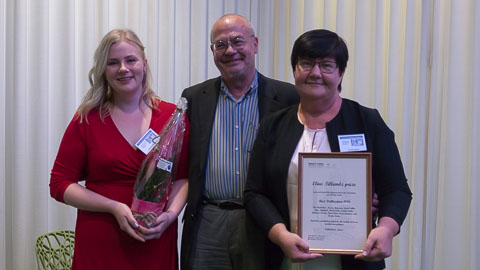Elias Tillandz Prize Awarded to Best BioCity Turku Publication in 2016
This year, the Elias Tillandz Prize was awarded to the best research article published by the BioCity Turku researchers in 2016. The ceremony was held during the BioCity symposium on 17 August.

Doctoral Candidate Norma Jäppinen (left) and Docent Pia Rantakari received the Prize. Professor Tapio Salmi from Åbo Akademi University handed the Prize to the researchers.
The Prize that is awarded to the best publication of BioCity Turku is named after Professor Elias Tillandz(1640‒1693). Tillandz introduced empirical life science to Finland and published the first scientific study in Turku. The Prize includes a grant.
The Åbo Akademi University Foundation funds the Prize.
There are over 100 research groups in the BioCity Turku organisation and they include over a thousand researchers from the University of Turku and Åbo Akademi University.
Fetal White Blood Cells Needed in Adulthood
The winning paper ”Fetal liver endothelium regulates the seeding of tissue-resident macrophages” was published in the Nature journal. The authors are Pia Rantakari, Norma Jäppinen, Emmi Lokka, Elias Mokkala, Heidi Gerke, Emilia Peuhu, Johanna Ivaska, Kati Elima, Kaisa Auvinen and Marko Salmi.
The prize-winning publication is based on a research conducted by the University's researchers at the MediCity research laboratory of the Faculty of Medicine who found a gene that regulates the migration of macrophages in tissues.
– We observed that deficiency of the PLVAP gene, which is only present in blood vessels, surprisingly causes major alterations in the macrophages of different tissues. The migration of fetal liver macrophages to other tissue is almost completely inhibited without the PLVAP gene, even though there were completely normal levels of bone-marrow-derived macrophages, say Docent Pia Rantakari and Doctoral Candidate Norma Jäppinen.
The researchers discovered that the deficiency of fetal liver macrophages had significant physiological consequences in adulthood. For example, the iron released from old red blood cells accumulated in the body because of the deficiency.
Furthermore, the deficiency of PLVAP protein blocked the development mammary branching in puberty almost entirely. The researchers' observations indicate that the macrophages that develop at different points of individual development have specialised in certain tasks in the body which extend outside the immune system.
The research group showed that the PLVAP protein is needed for regulating the transfer of fetal macrophage precursors from the liver to the blood stream and from there to different parts of the body.
– Without the PLVAP protein, these macrophage precursors are, in a way, stuck in the liver, says Rantakari.
The research was led by Professor Marko Salmi and conducted at the MediCity research laboratory of the Faculty of Medicine.
TS/MR
Photo: Tilda Junko